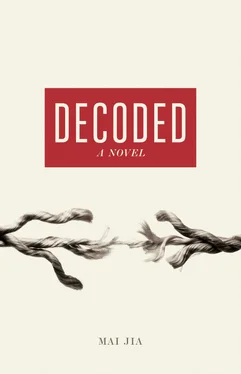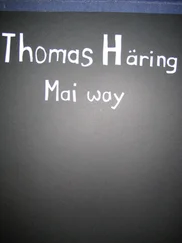Mai Jia - Decoded
Здесь есть возможность читать онлайн «Mai Jia - Decoded» весь текст электронной книги совершенно бесплатно (целиком полную версию без сокращений). В некоторых случаях можно слушать аудио, скачать через торрент в формате fb2 и присутствует краткое содержание. Год выпуска: 2014, Издательство: Allen Lane, Жанр: Современная проза, на английском языке. Описание произведения, (предисловие) а так же отзывы посетителей доступны на портале библиотеки ЛибКат.
- Название:Decoded
- Автор:
- Издательство:Allen Lane
- Жанр:
- Год:2014
- ISBN:нет данных
- Рейтинг книги:3 / 5. Голосов: 1
-
Избранное:Добавить в избранное
- Отзывы:
-
Ваша оценка:
- 60
- 1
- 2
- 3
- 4
- 5
Decoded: краткое содержание, описание и аннотация
Предлагаем к чтению аннотацию, описание, краткое содержание или предисловие (зависит от того, что написал сам автор книги «Decoded»). Если вы не нашли необходимую информацию о книге — напишите в комментариях, мы постараемся отыскать её.
Decoded — читать онлайн бесплатно полную книгу (весь текст) целиком
Ниже представлен текст книги, разбитый по страницам. Система сохранения места последней прочитанной страницы, позволяет с удобством читать онлайн бесплатно книгу «Decoded», без необходимости каждый раз заново искать на чём Вы остановились. Поставьте закладку, и сможете в любой момент перейти на страницу, на которой закончили чтение.
Интервал:
Закладка:
When this was reported to Mrs Rong in her prayer chamber, she sniffed the incense meditatively while she spoke: ‘Although people called his father horrible names too, in the case of the Killer, he was actually responsible for the death of his mother, a truly wonderful woman and a great credit to the Rong family. You could not find a better name for him if you searched for a month of Sundays. On the other hand, this baby was responsible for the death of shameless whore. That woman dared to blaspheme against the Buddha, a crime for which she deserves a thousand deaths! Killing her doesn’t count as a crime: it’s a work of merit. Calling the poor little thing the Grim Reaper does seem a little unfair. In the future we can call him Duckling, though it is hardly likely that he is going to grow into a swan.’
‘Duckling!’
‘Duckling!’
No one cared where he came from or who his parents were. ‘Duckling!’
‘Duckling!’
No one cared about whether he lived or died.
In all that great mansion, the only person who treated Duckling
like another human being — who treated him as he would any other child — was Mr Auslander, who had drifted there from the other side of the ocean. Every day after he had completed his morning tasks and had his midday siesta, he would walk along the dark little pebble path overhung with flowers to where the old servant couple lived. He would sit down next to the wooden crate in which Duckling was playing and smoke a cigarette, talking in his own language about the dream that he had had the night before. It seemed as though he were talking to Duckling but in fact he was talking to himself, because Duckling was still too little to understand. Every so often he would bring the baby a rattle or a little pottery toy, and bit by bit Duckling came to adore the old man. Later on, when Duckling learned to walk, or to be precise when he learned to crawl, the very first place he went on his own was to Mr Auslander’s office in the Pear Garden.
The Pear Garden, as the name suggests, was named after its pear trees: two hundred-year-old pear trees. There was a little wooden house in the middle of the garden, the attics of which had been used by the Rong family for storing their supply of opium and medicinal herbs. One year, a female servant disappeared in mysterious circumstances — to begin with they imagined that she had eloped with some man; later on they discovered her body, already badly decomposed, inside this building. The woman’s death was impossible to cover up: soon every single member of the Rong family and their entire staff knew all about it. Subsequently the Pear Garden became the subject of ghost stories and people were scared to go there; people would change colour when its name was mentioned and if children were being tiresome, their parents would threaten them, ‘If you don’t stop that immediately, we’ll leave you in the Pear Garden!’ Mr Auslander took advantage of other people’s fear of the place to live quietly and without interference. Every year when the pear trees flowered, Mr Auslander would look at the misty sprays of blossom and smell their intensely sweet fragrance with the feeling that this place was exactly what he had been looking for all these years. When the pear flowers fell, he would sweep up the fallen petals and dry them in the sun, before placing them in the building that he might enjoy the fragrance of the blossoms all the year round — a kind of eternal spring. When he wasn’t feeling well, he would make tea with the flowers. He found it very settling for his stomach; it made him feel a lot better.
After the first time that Duckling came, he came every day. He would not say anything, but he would stand underneath the pear trees and watch Mr Auslander in silence, timidly, like a frightened fawn. Since he had practiced standing up in his wooden crate from a very young age, he walked a little bit earlier than most other children. On the other hand he was much slower at learning to talk. At past two years of age, when other children of the same age were stringing together their first sentences, he could only make one sound — jia . . jia . This made people wonder whether he might not prove to be mute. However, one day when Mr Auslander was taking his lunchtime siesta on a rattan chaise longue, he suddenly heard someone call out to him in a desolate voice:
‘Dad. . dy!’
‘Dad. . dy!’
‘Dad. . dy!’
Mr Auslander realized that someone was trying to call him
‘Daddy’. He opened his eyes and saw that Duckling was standing next to him, tugging at his jacket with his little hand, his eyes wet with tears. This was the first time in his life that Duckling had ever called out to anyone, and he thought of Mr Auslander as his father. Since his father had seemed to him to be dead, he started crying, and when he cried, he brought his father back to life. That very day, the foreign gentleman took little Duckling into the Pear Garden to live with him. A couple of days later, the eighty-year-old Mr Auslander climbed up into one of the pear trees to hang a swing, to be little Duckling’s present on the occasion of his third birthday.
Duckling grew up surrounded by pear flowers.
Eight years later, just as the pear flowers were beginning their annual dance off the trees, Mr Auslander looked up at the flurries of petals whirling through the sky. Moving along with tottering steps, he carefully mulled over every word he planned to use. Every evening, he wrote out the lines that he had composed during the day. Within a couple of days he had formulated the letter which he sent to Young Lillie — the son of Old Lillie — at the provincial capital. That letter resided in a drawer for more than a year, but when the old man realized that he did not have much longer to live, he took it out again, telling Duckling to put it in the post. Due to the war, Young Lillie had no fixed abode and often moved around, so the letter did not reach him for a couple of months.
The letter said:
To: The Vice-Chancellor of the University
Dear Sir,
I do not know if writing this letter to you will be the last mistake I ever make. It is because I think I might be making a mistake, and because I would like to spend more time with Duckling, that I will not immediately put this letter in the post. By the time this letter reaches you, I will be dying; in which case — even if it is a mistake — I will no longer care. I can use the special powers granted to those who are about to die to refuse to carry any further the burdens life has placed upon me. These burdens have been, if I may say so, quite sufficiently numerous and heavy. However, I am also planning to use the all-seeing eyes supposed to be granted to the dead to check up on how seriously you take the points raised in my letter and what you propose to do about them. In many ways, you could say that this is my last will and testament. I have lived on this difficult and dangerous planet for a long time — almost a century. I know how well you treat the dead in this country, not to mention how badly you treat the living. The first is entirely praiseworthy; the latter is not. It is for this very reason that I am certain you will not disobey my final instructions.
I have only one regret and that is Duckling. I have been his guardian for many years, faute de mieux, but now I can hear the bell tolling for me and it is clear that I have only a few days left. It is time for someone else to take care of him. I beg you to take over as his guardian. There are three reasons that you would be the perfect choice.
1. It is thanks to your bravery and generosity — you and your father (Old Lillie) — that he was ever born at all.
2. Whether you admit it or not, he is a member of the Rong family and his grandmother was the person that your father loved and admired more than anyone else in the world.
Читать дальшеИнтервал:
Закладка:
Похожие книги на «Decoded»
Представляем Вашему вниманию похожие книги на «Decoded» списком для выбора. Мы отобрали схожую по названию и смыслу литературу в надежде предоставить читателям больше вариантов отыскать новые, интересные, ещё непрочитанные произведения.
Обсуждение, отзывы о книге «Decoded» и просто собственные мнения читателей. Оставьте ваши комментарии, напишите, что Вы думаете о произведении, его смысле или главных героях. Укажите что конкретно понравилось, а что нет, и почему Вы так считаете.












